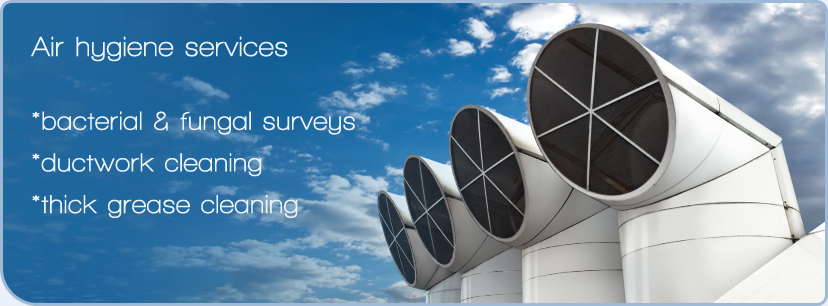
Eurocom Technical Services undertakes pre-treatment bacteria
and fungal surveys upon which a cleaning programme can be
based. Cleaning is carried out using physical and solvent
– enhanced methods. These methods incorporate the use
of several techniques including remote operated rotating
vacuumed filtration equipment. The system is then disinfected
by completely fogging using a specialist chemical; this
ensures that hygiene and cleanliness are of the highest
possible standard. Analytical swabs are taken to confirm
the works have been satisfactorily carried out. During the
process it could be necessary to install additional access
doors at appropriate intervals within the system as per
B&ES (Building & Engineering Services Association)
TR19 specifications. Eurocom engineers can make recommendations
and fit as required.
Our services include:
- Mechanical cleaning of air conditioning ductwork to
B&ES TR19 requirements, to ensure energy reductions or
minimal use of energy due to clean resistance free systems
- Access doors and fire dampers supplied and fitted
- Air quality management and ongoing monitoring of air
ductwork systems, including sampling
- Biocidal disinfection of ductwork systems
- Mechanical cleaning of Kitchen Extract Systems
- Fire Damper Maintenance and Validation to the latest
Fire Risk Assessment standards
- Inspection and Certification of LEV Systems maintained
to HSG258
- All air hygiene works comply with B&ES TR19 guidance
– a specific requirement by insurance companies with
regard to Kitchen Extract Systems and TM:26
- Ventilation hygiene risk assessments, also (VHRA) for
Indoor Air Quality monitoring
- Filtration units and housing including safe change and
side access

Air Hygiene Risk Assessment
We carry out air quality sampling
which consists of:
- Particulates
- Bacterial and fungal counts
- CO2 and CO levels
- Temperature and humidity
We also carry out risk assessments of all air ducted systems
to the requirements of B&ES, TR17 and BSRIA specifications.
Our air hygiene surveys include CCTV video footage for inaccessible
areas of ductwork.

Benefits
A number of benefits may be derived from the cleaning of
ventilation systems:
- Staff efficiency - in extreme cases where "Sick
Building Syndrome" has been experienced, there should
be a noticeable drop of staff absenteeism and productivity
will increase.
- Fire Safety - by reducing the contamination in
the ducting, the combustion load of fire safety is greatly
enhanced.
- Image - it will improve the environmental image
of the company.
- Costs - there is a potential to reduce the running
costs due to reduction in electrical loading and in certain
instances fuel consumption.
- Mechanical Efficiency - is increased and a reduction
in airborne dusts can help to protect sensitive equipment.

Ductwork Cleaning Methods
Rotary Brush System
The ductwork can be cleaned by using a rotary brush system
that can rotate both clockwise and anti-clockwise. Different
sized brushes can be used to suit the various sizes of ductwork
that require cleaning. The supply diffusers extract grilles
or access covers are removed in order to facilitate the
cleaning works.
A powerful extraction ventilator with overflow of 4500³m/h
is attached to the extraction point creating a vacuum that
removes the dust.
The rotary brush is fed into the ducting and agitates the
contamination away from the duct walls, the contamination
is then carried in the air flow to a filter located in the
powerful ventilator and then collected into the bags. The
supply diffusers and extract grilles are manually cleaned
using industrial cleaning machines and replaced on completion.
The Jet Air Knife System
The ductwork can also be cleaned using the jet air knife
system in conjunction with a negative air extraction unit.
The negative air extraction unit is connected to access
points along the ducting, the air knife is then propelled
down the ducting by compressed air, this subsequently releases
the contamination which is drawn into the suction of the
negative air extraction unit into a filtered system.
This system can reduce the number of access doors required
as the jet air knife only needs a 38mm access point, which
when works are completed would have a 38mm grommet installed.
Eurocom Technical Services will produce a “before and
after” photographic report along with a Certificate
of Conformity which can be used in your Health, safety and
welfare manual.

Legislation
The Workplace (Health and Safety Welfare) regulations
1992 – require that effective provision should
be made to ensure that every enclosed workplace is ventilated
by a sufficient quantity of fresh purified air. Where this
ventilation is provided by mechanical means, the regulation
require those mechanical ventilation systems to be maintained
(including cleaned as appropriate) on an efficient state,
in efficient working order and in good repair. Failure to
carry out these duties is a breach of the regulations.
The Approved Code of Practice (ACoP) Regulation 6
– states that: Mechanical Ventilation Systems, including
air conditioning systems, must be regularly tested and cleaned
to ensure that they do not contain anything which may contaminate
the air.
Health and Safety at Work Act 1974 – lays down
that the employers or person concerned with the premises
owe the “common duty of care” both to the employers
and others who may use or visit the premises. They are required
to exercise this duty “so far as is responsibly practical”.
The Control of Substances Hazardous to Health (COSHH)
Regulations, Statutory Instrument No 1657, 2004 –
this requires an employer to make a formal assessment of
health risks from hazardous substances, which includes human
pathogens or any other dusts present in substantial quantities
in the air. Regulation 7 (1) requires the employer to prevent
exposure of his employees to substances hazardous to health,
or where this is not practical, to ensure that any exposure
is adequately controlled.
The Occupiers’ Liability Act 1984 - impose
a duty of care on an occupier of premises to prevent (so
far as reasonably practicable) risk to others of injury,
which includes any disease and impairment of physical or
mental condition.













